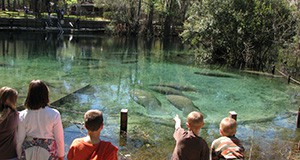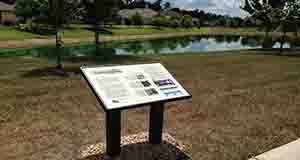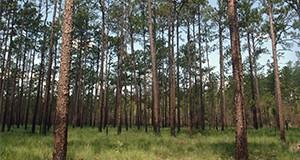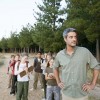
Early childhood is a crucial period for the physical and cognitive development of children. Most people who care for young children realize that children benefit from playing outside, but caretakers might not have ready access to the literature that supports their observations. This 4-page fact sheet written by Kristen Poppell and Martha C. Monroe and published by the School of Forest Resources and Conservation reviews some of the literature that shows that young children need to go outside and be around nature regularly. It describes some of the benefits children (and adults!) gain from learning and playing outdoors and includes suggestions for several resources for parents, teachers, and caretakers who hope to increase these opportunities for their youngsters.
edis.ifas.ufl.edu/fr394
Tag: Environmental Education
Conservation Subdivision: Post-construction Phase: Creating Signs to Educate Residents

Installing educational signs is one way to increase awareness and participation in conservation activities. This six-page fact sheet written by Mark Hostetler and published by the Department of Wildlife Ecology and Conservation explains how to create educational signs and install them in residential neighborhoods as a way to inform residents about biodiversity conservation. The fact sheet, one of the UF/IFAS Conservation Subdivision series, explains how to design effective signs, how to manage a series of signs to keep the information fresh, and how to maintain the signs to ensure that residents and visitors to the community continue to benefit and maintain their homes, yards, and neighborhoods sustainably for years to come.
http://edis.ifas.ufl.edu/uw407
Some Challenges behind Communicating about Climate Change
 Media coverage of climate change can often leave the average person confused and unsure what to believe. However, as a trusted source of information and research, Extension has the opportunity to educate people about climate change and appropriate adaptation strategies in a scientific, unbiased way. This 5-page fact sheet outlines four challenges of climate change education. Written by Martha Monroe, Claire Layman Bode, and Mark A. Megalos, and published by the UF School of Forest Resources and Conservation, May 2015.
Media coverage of climate change can often leave the average person confused and unsure what to believe. However, as a trusted source of information and research, Extension has the opportunity to educate people about climate change and appropriate adaptation strategies in a scientific, unbiased way. This 5-page fact sheet outlines four challenges of climate change education. Written by Martha Monroe, Claire Layman Bode, and Mark A. Megalos, and published by the UF School of Forest Resources and Conservation, May 2015.
http://edis.ifas.ufl.edu/fr392
Cooperative Learning for 4-H
 A simple way to facilitate discovery through cooperative learning, in which learners work together to meet a shared goal with a leader guiding them to encourage group interactions. This 5-page fact sheet provides teaching techniques and applies cooperative learning to natural resources and environmental literacy in the context of 4-H. Written by Jessica McIntosh and Martha Monroe, and published by the UF Department of School of Forest Resources and Conservation, September 2014.
A simple way to facilitate discovery through cooperative learning, in which learners work together to meet a shared goal with a leader guiding them to encourage group interactions. This 5-page fact sheet provides teaching techniques and applies cooperative learning to natural resources and environmental literacy in the context of 4-H. Written by Jessica McIntosh and Martha Monroe, and published by the UF Department of School of Forest Resources and Conservation, September 2014.
http://edis.ifas.ufl.edu/fr390
Environmental Education Resources from Federal and State Agencies (FOR100/FR128)
 Going on a field trip? Want a spiffy new poster? Looking for a guest speaker? Or do you just need to know more about wildland fire, endangered species, coastal management, or invasive exotics? Many agencies are available to provide information, share resources, support field trips, and contribute to your environmental education programming. This 8-page fact sheet explores federal and state agencies in Florida with major educational resources. Written by Martha C. Monroe and Alison W. Bowers, and published by the UF Department of School of Forest Resources and Conservation, December 2012.
Going on a field trip? Want a spiffy new poster? Looking for a guest speaker? Or do you just need to know more about wildland fire, endangered species, coastal management, or invasive exotics? Many agencies are available to provide information, share resources, support field trips, and contribute to your environmental education programming. This 8-page fact sheet explores federal and state agencies in Florida with major educational resources. Written by Martha C. Monroe and Alison W. Bowers, and published by the UF Department of School of Forest Resources and Conservation, December 2012.
http://edis.ifas.ufl.edu/fr128
Beyond the Trees: A Systems Approach to Understanding Forest Health in the Southeastern United States (FOR287/FR355)
 Forest health is an important topic for biology, agriculture, current issues, and environmental science classes. But conversations with educators suggested that they were not equipped to teach about it given their existing curricula. This 79-page educator guide includes six activities designed to help learners consider forest health from various viewpoints; understand interrelationships and feedback mechanisms in a forest system; visualize spatial and temporal mechanisms of forest system functions; appreciate the variety of threats to forest health; and consider their role as future forest stewards. Written by Geetha S. Iyer, Martha M. Monroe and Jason A. Smith, and published by the UF Department of School of Forest Resources and Conservation, July 2011.
Forest health is an important topic for biology, agriculture, current issues, and environmental science classes. But conversations with educators suggested that they were not equipped to teach about it given their existing curricula. This 79-page educator guide includes six activities designed to help learners consider forest health from various viewpoints; understand interrelationships and feedback mechanisms in a forest system; visualize spatial and temporal mechanisms of forest system functions; appreciate the variety of threats to forest health; and consider their role as future forest stewards. Written by Geetha S. Iyer, Martha M. Monroe and Jason A. Smith, and published by the UF Department of School of Forest Resources and Conservation, July 2011.
http://edis.ifas.ufl.edu/fr355
WEC263/UW308 How To Make a Treefrog House
WEC-263, a 3-page illustrated fact sheet by Monica E. McGarrity and Steve A. Johnson, provides simple instructions for children to make, decorate and monitor a treefrog house. Published by the UF Department of Wildlife Ecology and Conservation, June 2009.
http://edis.ifas.ufl.edu/UW308
FOR220/FR282 Addressing Sunshine State Standards in Elementary School Teacher Professional Development Workshops
FOR-220, a 6-page illustrated fact sheet by Jennifer A. Seitz, Martha C. Monroe, and Kimberly O. Thurman, use Project Learning Tree (PLT) workshops as an example of how anyone conducting professional development workshops can improve attendance and enhance program use by public school teachers by identifying and advertising the Sunshine State Standards (SSS) that the workshops address. Published by the UF School of Forest Resources and Conservation, May 2009.
http://edis.ifas.ufl.edu/FR282
FOR-105/FR135 Enhancing Natural Resource Programs with Field Trips
FOR-105, a 5-page illustrated fact sheet by Julie Athman and Martha C. Monroe, explains how to maximize learning during the field trip to ensure that students gain its cognitive and affective benefits. Includes references. Published by the UF School of Forest Resources and Conservation, October 2008.
http://edis.ifas.ufl.edu/FR135
FOR200/FR262 English Creek Native Tree and Plant Tour
FOR200, a 3-page fact sheet by Michael G. Andreu, Melissa H. Friedman, and Mary E. Thornhill, Describes the English Creek Preserve Native Tree and Plant Tour, with instructions for downloading and printing out a guidebook designed for use along the raised boardwalk trail, although it can also be used to identify trees and plants outside the preserve. Published by the UF School of Forest Resources and Conservation, October 2008.
http://edis.ifas.ufl.edu/FR262
FOR-193/FR254 Social Marketing in the Wildland-Urban Interface
FOR-193, a 4-page illustrated fact sheet by Martha C. Monroe, focuses on social marketing strategies for promoting important messages and ideas in the interface. Includes references. Published by the UF School of Forest Resources and Conservation, July 2008.
http://edis.ifas.ufl.edu/FR254
FOR 109/FR157 Improving Inservice Teacher Workshops in Florida
Revised! FOR-109, a 5-page fact sheet by Martha C. Monroe, Jenny Seitz, Shruti Agrawal, Sheda Morshed, Elizabeth Swiman, Michelle Aldridge, and Vicki Crisp, defines the terms that are most helpful for Florida environmental education workshop facilitators and provides suggestions for planning, advertising, delivering, and evaluating workshops to better meet the needs of our teachers. Project Learning Tree (PLT) workshops are used as an example of how nonformal education facilitators could adapt their workshops to better address the new professional development system. Published by the UF School of Forest Resources and Conservation, May 2008.
http://edis.ifas.ufl.edu/FR157
FOR 172/FR231 Urban Forest Educational Resources for Teaching Youth
FOR-172, a 5-page fact sheet by Jennifer Seitz, Martha Monroe and Francisco Escobedo, lists and describes resources available to assist educators, extension agents, home school parents, foresters, and nature center staff as they help youth become more aware of the urban forests in their backyard. Published by the UF School of Forest Resources and Conservation, January 2008.
http://edis.ifas.ufl.edu/FR231